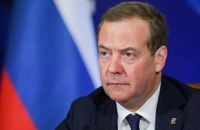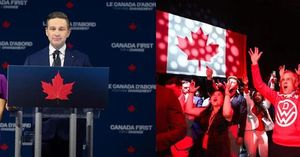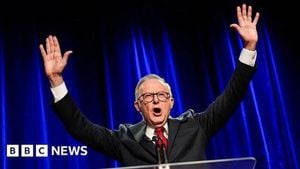Dmitry Medvedev, the Deputy Head of the Security Council of Russia, has sharply criticized U.S. President Donald Trump’s recent statements regarding the contributions of the United States to the victory in World War II, labeling them as "pompous nonsense." This exchange highlights the ongoing tensions between Russia and the U.S. regarding historical narratives and national pride.
On May 2, 2025, Trump declared May 8 as Victory in Europe Day in the U.S., asserting that America made an incomparably greater contribution to defeating Nazism than any other nation. He proclaimed that the U.S. had won both world wars, claiming, "no one even came close in strength, courage and military skill" to the Americans. Furthermore, Trump emphasized, "Americans did more for victory in World War II than any other country, incomparably more."
Medvedev responded to these claims on his VKontakte page, where he stated, "the holiday is bad, but the conclusion is pompous nonsense." He stressed the heavy toll the Soviet Union paid during the war, noting that "our people laid down 27 million lives of their sons and daughters in the name of destroying the cursed fascism." Medvedev firmly declared that "Victory Day is ours, and it is on May 9! It was, it is, and it always will be!"
The disagreement over the date and significance of Victory Day reflects deeper historical and cultural divides. Traditionally, May 9 is celebrated in Russia and other former Soviet states as the day marking the defeat of Nazi Germany, while May 8 is recognized in the U.S. as Victory in Europe Day. This difference in observance underscores contrasting perspectives on the war's legacy.
Medvedev’s remarks also serve as a reminder of the broader narrative that Russia has sought to promote regarding its role in World War II. The country has long emphasized the sacrifices made by its citizens in the fight against fascism, viewing the war as a defining moment in its national history. In contrast, the U.S. narrative often highlights its military prowess and the decisive role it played in securing victory.
On April 30, 2025, Russian President Vladimir Putin called for a vigorous defense of the historical truth surrounding World War II. He expressed concern about attempts to distort history and downplay the Soviet Union's contributions to the war effort. Putin stated, "Russia faces serious challenges due to attempts to falsify history and diminish the role of the Soviet Union in achieving Victory."
This ongoing historical debate is not merely academic; it has real implications for contemporary international relations. The differing interpretations of World War II have fueled tensions between Russia and Western nations, as each side seeks to assert its narrative in the face of perceived historical inaccuracies.
In recent years, the issue of historical memory has become increasingly politicized. In Russia, Victory Day celebrations have grown in prominence, featuring military parades and public displays of patriotism. These events serve not only as a commemoration of the past but also as a means of fostering national unity and identity in the present.
Meanwhile, in the U.S., the memory of World War II is often invoked in discussions about military engagement and foreign policy. Trump's comments reflect a broader American sentiment that values military strength and heroism, which can sometimes overshadow the complex realities of the war.
As the 80th anniversary of the end of World War II approaches, the clash of narratives is likely to intensify. Both Russia and the U.S. will continue to grapple with their respective histories, each seeking to validate its perspective in the eyes of its citizens and the international community.
Ultimately, this dispute over historical memory is not just about the past; it shapes how nations view themselves and each other in the present. As long as these differing narratives persist, the potential for misunderstanding and conflict remains significant.
In this context, Medvedev's comments serve as a stark reminder of the importance of historical memory in shaping national identity and international relations. As countries navigate their complex histories, the need for dialogue and understanding becomes ever more critical.
As we reflect on the legacies of World War II, it is essential to recognize the sacrifices made by all nations involved, while also acknowledging the differing perspectives that continue to influence contemporary geopolitics. The narratives we choose to embrace will undoubtedly shape the future of international relations and the way we remember our shared history.





